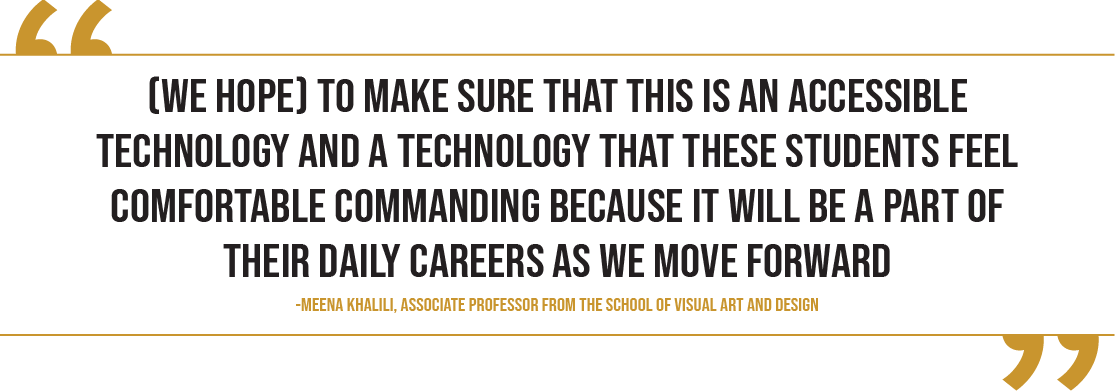Eight faculty members from the College of Arts and Sciences received grants from the McCausland Innovation Fund to develop new courses and redesign existing ones to incorporate artificial intelligence between spring 2024 and the following 2024-2025 academic year.
The fund supports innovative teaching and research projects from the College of Arts and Sciences that enhance student experience. The fund issued a special proposal call for projects that engage with artificial intelligence.
Provost Donna Arnett spoke on the importance of AI during a discussion about hiring new faculty at the Dec. 6 faculty senate meeting.
"We also had requests for fields like AI because AI ... is going to transform how we teach, what we teach and how students learn," Arnett said. "We're already doing some of that. Arts and Science is ahead of the game."
Rutvik Harshad Desai, a professor in the Department of Psychology, is developing a course called “Minds, Brains, and Artificial Intelligence,” which applies elements of psychology and philosophy to AI. Students will learn about large language models and conduct different tests to determine whether a system or person can be considered intelligent. The course will be offered in the spring of 2025.
Instructor Megan McKay and Professor Peter Binev from the Department of Mathematics are collaborating to develop McKay’s course, “Mathematical Concepts for Data Analysis,” for the new data analytics major that will be made available in the fall of 2024.
The course, designed for students who have taken an entry level course in calculus or statistics, will integrate examples of AI into its curriculum. Students will learn the mathematical foundations behind data science and AI as well as how those concepts are used in AI applications.
Associate Professor Michael Gavin said that the Department of English Language and Literature is modifying pre-existing English courses to explore AI as well.
Courses will cover topics such as writing with AI, the history of AI and ethical considerations of AI, which will be effective for studying how computer and information science overlaps with linguistics, he said.
Assistant Professor Tad Dallas from the Department of Biological Sciences will look to revise the course “Ecoinformatics,” which teaches students how to analyze data and think programmatically.
Under Dallas’s revision, the course will include a module that distinguishes AI from machine learning concepts and teaches students how to train models. The course will be taught this fall.
"I want to teach people that you can get inference from these models, and they can be super duper useful in ecology and evolution and outside," Dallas said. "It's also just something I've been pushing for is more computational literacy among biologists."
Associate Professor Meena Khalili from the School of Visual Art and Design is updating the course "Processes and Systems" to integrate new technologies and platforms such as Stable Diffusion to teach students about design solutions that use AI.
Students enrolled in the class will learn to become familiar with training models and data visualization as well as consider questions of ethics, Khalili said. The updated course will be made available in the spring of 2025.
Professor Leah McClimans from the Department of Philosophy will redesign the course "Ethics in Science and Technology" into "AI Ethics," where students will examine ethical considerations of different technologies.
Charles Andy Schumpert, a lab coordinator from the Department of Biological Sciences, will revise four biology courses to teach students how to use AI ethically to increase access and opportunity. And Michael Stoeltzner, a professor from the Department of Philosophy, will restructure the "Engineering Ethics" course to engage with ethical challenges of AI in engineering.
Multiple faculty members who received the McCausland Innovation Fund said that it is important for students to understand how to use AI for various reasons.
Khalili said that she wants to make sure students understand AI because it will play a major role in their professional lives.
“(We hope) to make sure that this is an accessible technology and a technology that these students feel comfortable commanding because it will be a part of their daily careers as we move forward,” Khalili said.

Desai said that AI's increasingly prominent role in society makes it important for students to understand how the technology works. Collaboration between disciplines can create new connections, he said.
“Within one discipline we sometimes tend to get boxed in with certain kind of views or certain opinions, and when you look at somebody from a different discipline, we might disagree, but (it might) give us completely fresh ideas, fresh perspectives that we had not thought about in a single discipline,” Desai said.
Chair of the Department of Computer Science and Engineering Homayoun Valafar said that communication between departments can help to develop true interdisciplinary courses.
“Obviously, it’s a great idea to actually cross the boundaries of normally separated disciplines, and that’s where all the interesting stuff happens,” Valafar said. “But I feel like it’s too much for a person to just come take one class for example, where they grasp the basics of neuroscience and artificial intelligence and computer science, to put it to a good use.”
The university’s budgeting system "fosters a more competitive environment," which can often hold back collaboration, Valafar said.
McKay and Binev said students can benefit from taking courses from other disciplines to become more well-rounded.
“I would love to have the mathematicians taking some courses outside of the department,” Binev said. “But usually, the interests are always around mathematics, and if we have interdisciplinary majors, it would be fantastic.”
The full list of projects sponsored by the McCausland Innovation Fund are available on USC's website.

